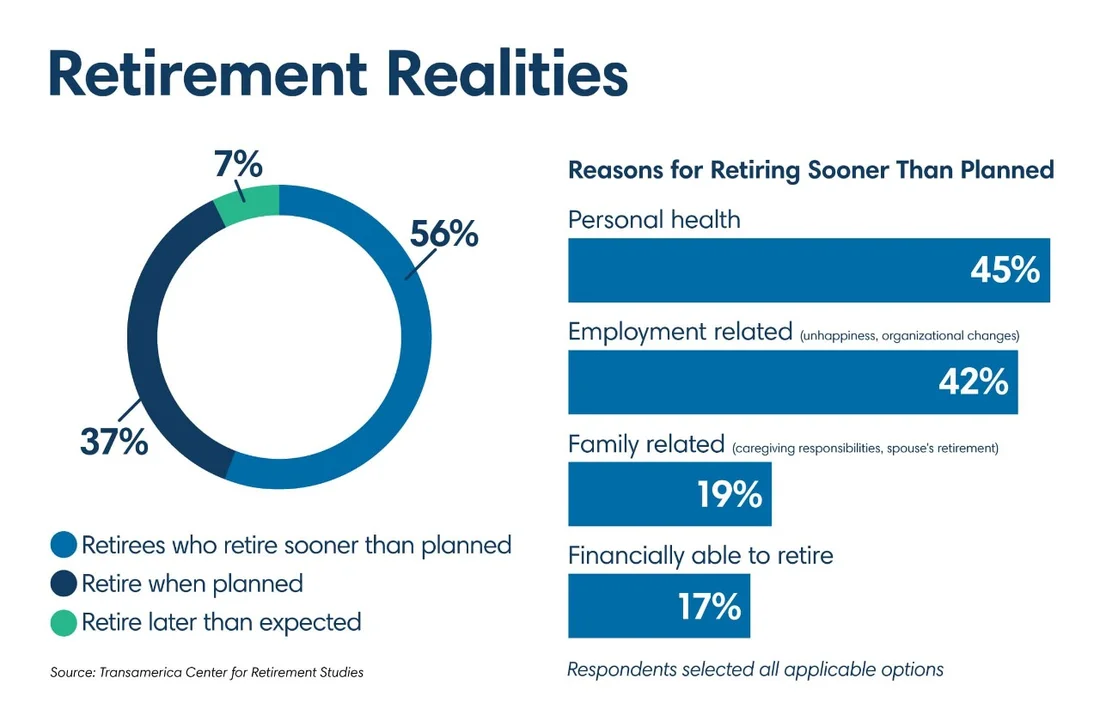Digital banking for business
Seamlessly access all of your accounts from one place with First Citizens Digital Banking for business.
Many of us have a picture-perfect vision of retirement: leisurely days filled with travel, hobbies and relaxation—all supported by a well-earned nest egg.

So when life throws a curveball and you're forced to retire early due to a medical condition or accident, it can be overwhelming. There's the immediate physical and emotional shock, but the ripple effects go even further—from changes in lifestyle to loss of income.
Although difficult to predict or prepare for, an early retirement due to a disability doesn't have to have a devastating financial impact. There are strategies to tackle economic uncertainties, find emotional stability and craft a new, fulfilling chapter in your life.
Saving enough money for retirement can be challenging, even before the introduction of an unforeseen disability. A 2022 Federal Reserve survey found that the median retirement savings for all US households was just $87,000.
When you're suddenly forced to retire earlier than expected, the abrupt change can rattle even the most prudent and prepared planners. When you factor in lost income, a shorter timeframe for saving and additional healthcare-related expenses, the money you've saved for retirement may be exhausted quicker than expected.
But this shouldn't cause panic. Stepping back to fully assess the situation may help you manage and mitigate the negative impacts. To start, you'll need to assess your new normal.
"First and foremost, your life has been forever altered in some fashion. I think the shock of the lifestyle changes that are going to be necessary are the most glaring," says Craig Shively, a financial planner with First Citizens Investor Services. "You're going to need help to manage all this."

Your first concern should be ensuring you get all the medical attention you need. Depending on your specific condition, this could mean hospital stays, surgeries, prescription medicines, rehabilitation and various forms of therapy. These treatments can be expensive, but medical insurance should cover some of it.
It's important, however, to look beyond your physical needs. "I think it's incumbent to make sure there's something in place to maintain mental well-being," Shively says. "That could be hobbies, social networks, church groups, civil groups, volunteering—things to keep our minds as sharp as possible."
There may be other changes beyond healthcare costs, such as making changes to your home or vehicle to be more accessible for someone with a disability.
And you may not be the only one facing change. Family members—especially those responsible for caregiving—have likely discovered that their lives also look different. They might also need assistance ranging from emotional support to dedicated time for themselves.
"You may need to hire someone to come in for a few hours a day to help with the activities of daily living—things as simple as cooking food and cleaning up around the house," Shively says. While these services come at an extra expense, they can provide significant support and relief not only for caregivers but also the person with the disability.
It's difficult to prepare for a sudden, unexpected medical event or accident that prevents you from working. Fortunately, options are available to replace at least some of the lost income. Once you better understand what income will be lost and what expenses may arise, it's time to sit down and determine a realistic monthly cash flow and budget. As part of this process, consider the following resources.
Although the balances on your personal savings and retirement accounts might not be as high as you'd like, you'll probably need to use them to cover some of the costs associated with your new situation.
As soon as possible, review your current balances and investments with your financial advisor to determine if any adjustments—like making your investments less risky to help avoid potential losses—need to be made to your personal portfolio.
Although there's typically a penalty for withdrawing money from a retirement account before age 59 1/2, this fee is often waived for people with a permanent disability.
Most employers offer short- and long-term disability insurance, either as part of their benefits package or as an elective option you can purchase. If you're unsure of the terms and costs of your employer-provided disability insurance, contact your company's human resources department.
You can also purchase disability insurance coverage in the private market. If you have long-term care insurance, check the policy terms to see what expenses it covers. Be aware that long-term disability insurance policies often have delays, typically 3 to 6 months before the benefits kick in.
Another common source of funds to replace lost income is the Social Security Administration, which offers disability benefits to individuals and certain family members. According to the agency's most recent Disability Insurance statistical report (PDF), more than 8.7 million people received about $12.7 billion in Social Security disability insurance payments in 2023.
Whether you qualify for Social Security disability benefits depends on several factors—including whether you've accumulated enough work credits, which are earned by working and paying social security taxes. Shively also notes that the monthly benefit will likely be far less than what you would've received if you had worked until full retirement age.
Depending on where you live, there may be financial assistance at the state or local level, as well as programs to support injured veterans. These programs vary widely, so you'll need to do some research to determine what benefits are available and whether you qualify. If you receive Social Security Disability Insurance benefits for 2 years, you automatically qualify for Medicare—regardless of age.
Figuring out what comes next after a sudden disability can be daunting, but you don't have to manage the changes on your own. Shively recommends assembling a team of professionals who can help guide you through the process.
"Meeting with your financial planner, CPA and attorney on an ongoing basis—especially after an event like this—is paramount to getting the advice you'll need going forward," he says.
According to Shively, there could be financial consequences if you move into a different tax bracket or need to withdraw some of your assets to supplement your income. Legal and estate documents—such as power of attorney, will and trust documents—may also need to be created or updated.
Sudden retirement due to an accident or medical condition is a life-altering event with far-reaching implications. There will be challenges, but by understanding your options, seeking financial advice and adjusting your lifestyle, you can manage the impacts on your financial well-being and find new ways to enjoy retirement.
Email Us
Please select the option that best matches your needs.
Customers with account-related questions who aren't enrolled in Digital Banking or who would prefer to talk with someone can call us directly.